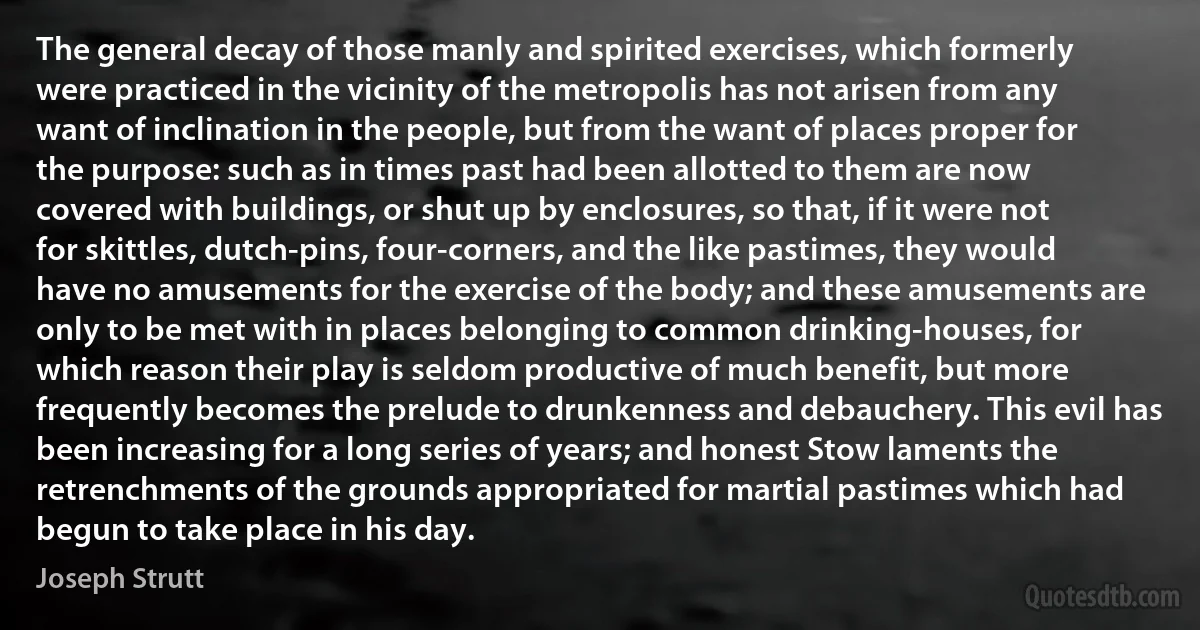
The general decay of those manly and spirited exercises, which formerly were practiced in the vicinity of the metropolis has not arisen from any want of inclination in the people, but from the want of places proper for the purpose: such as in times past had been allotted to them are now covered with buildings, or shut up by enclosures, so that, if it were not for skittles, dutch-pins, four-corners, and the like pastimes, they would have no amusements for the exercise of the body; and these amusements are only to be met with in places belonging to common drinking-houses, for which reason their play is seldom productive of much benefit, but more frequently becomes the prelude to drunkenness and debauchery. This evil has been increasing for a long series of years; and honest Stow laments the retrenchments of the grounds appropriated for martial pastimes which had begun to take place in his day.
Joseph StruttRelated topics
begin benefit body common day drunkenness evil general increasing martial met metropolis now past people place play prelude proper purpose reason series shut take times vicinity yearsRelated quotes
It is admitted that the power of taxing the people and their property is essential to the very existence of Government, and may be legitimately exercised on the objects to which it is applicable, to the utmost extent to which the Government may choose to carry it. The only security against the abuse of this power is found in the structure of the Government itself. In imposing a tax, the legislature acts upon its constituents. This is, in general, a sufficient security against erroneous and oppressive taxation. The people of a State, therefore, give to their Government a right of taxing themselves and their property, and as the exigencies of Government cannot be limited, they prescribe no limits to the exercise of this right, resting confidently on the interest of the legislator and on the influence of the constituent over their representative to guard them against its abuse.

John Marshall
The revolution of 1832 was, therefore, in its ultimate results, a democratic revolution, though its earlier form was transitional and incomplete. This form was productive of great advantages for the time: indeed, for some years it might be said, without exaggeration, that the accidental equilibrium of political forces which it had produced presented the highest ideal of internal government the world had hitherto seen. But it was not the less provisional on that account. The forces by which political organisms are destroyed were, for the time, balanced by influences which still lingered, and were, therefore, neutralised. But these were increasing, and the others were decaying, and the balance could not last for any length of time. It has now been finally upset, and we have now fully reached the phase of political transformation to which the revolution of 1832 logically led.

Robert Gascoyne-Cecil, 3rd Marquess of Salisbury
I think I've gone through quite an ordinary series of steps in life. I began as most children began, with God and Santa Claus and the tooth fairy and the Easter Bunny all being about the same thing. Then I went through the things that I think sensitive people go through, wrestling with the thoughts of Jesus-did he shit? Did he screw? I began to dare to believe that God wasn't some white beard. I began to look upon the miseries of the human race and to think God was not as simple as my mother said. As nearly as I can concentrate on the question today, I believe I am God; certainly you are, I think we intelligent beings on this planet are all a piece of God, are becoming God. In some sort of cyclical non-time thing we have to become God, so that we can end up creating ourselves, so that we can be in the first place. ... My own feeling is that relation to God as a person is a petty, superstitious approach to the All, the infinite.

Gene Roddenberry
According to the teaching of the Church, men and women with homosexual tendencies 'must be accepted with respect, compassion and sensitivity. Every sign of unjust discrimination in their regard should be avoided'. They are called, like other Christians, to live the virtue of chastity. The homosexual inclination is however 'objectively disordered' and homosexual practices are 'sins gravely contrary to chastity'.In those situations where homosexual unions have been legally recognized or have been given the legal status and rights belonging to marriage, clear and emphatic opposition is a duty. One must refrain from any kind of formal cooperation in the enactment or application of such gravely unjust laws and, as far as possible, from material cooperation on the level of their application. In this area, everyone can exercise the right to conscientious objection.

Pope Benedict XVI
It has always been my ambition since childhood to live such a life that one day my fellow citizens would call me to membership in this popular branch of the greatest lawmaking body in the world. Out of their confidence and partiality they have done this. It is now my sole purpose here to help enact such wise and just laws that our common country will by virtue of these laws be a happier and a more prosperous country. I have always dreamed of a country which I believe this should be and will be, and that is one in which the citizenship is an educated and patriotic people, not swayed by passion and prejudice, and a country that shall know no East, no West, no North, no South, but inhabited by a people liberty loving, patriotic, happy, and prosperous, with its lawmakers having no other purpose than to write such just laws as shall in the years to come be of service to human kind yet unborn.

Sam Rayburn
